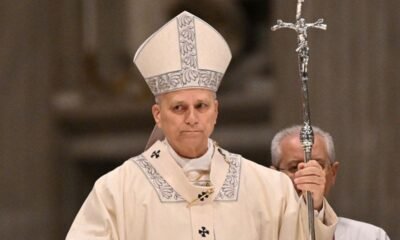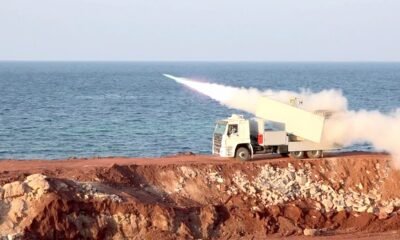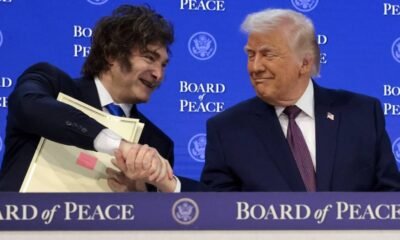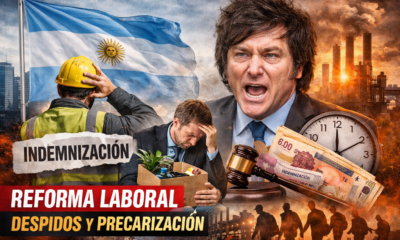INTERNACIONAL
Russia shifts from talk to action, targeting NATO homeland amid fears of global war
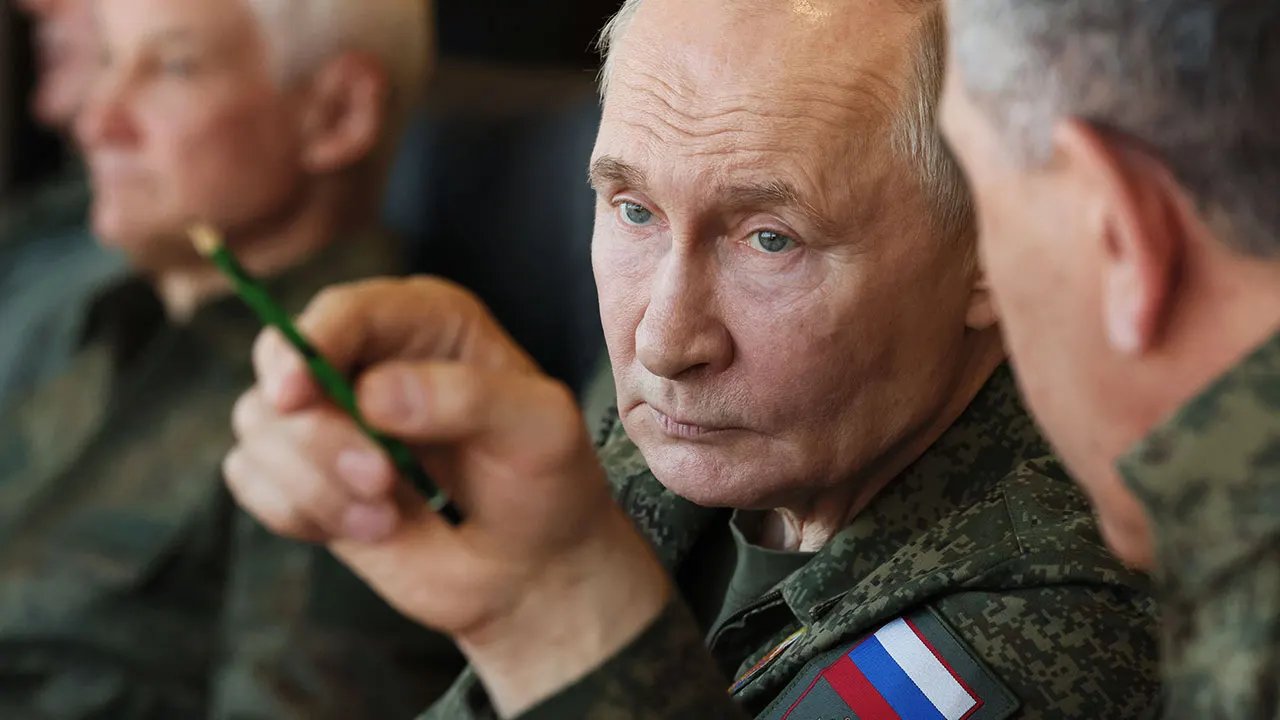
NEWYou can now listen to Fox News articles!
NATO has been on high alert since Russia invaded Ukraine more than three and a half years ago, but a recent spike in the alliance’s airspace violations has security experts increasingly concerned that warnings of war with Moscow are no longer theoretical, but inevitable.
President Donald Trump on Thursday said the U.S. could «end up in World War III» over Russia’s war in Ukraine and conceded that Russian President Vladimir Putin has «let him down» over his refusal to end his military campaign.
One day later, Russia sent three fighter jets over Estonia’s capital city of Tallinn in a direct and clear violation of its airspace, prompting another NATO member to spark Article 4 for the second time in as many weeks.
A picture shows French Mirage 2000 fighter jets flying over Estonia, on March 30, 2022. (Didier Lauras/AFP via Getty Images)
RUSSIAN JETS VIOLATE ESTONIAN AIRSPACE, FOREIGN MINISTER SAYS
«Russia is testing NATO again— dozens of drones in Poland last week, drones in Lithuania, Latvia, Estonia, and now fighter jets in Estonian skies. These are deliberate provocations,» Lithuanian Defense Minister Dovile Sakaliene told Fox News Digital. «They are deliberate tests—tests of our readiness, our resolve, and of the limits of our deterrence.»
Sakaliene said the Friday violation was just the latest in «an escalating pattern of pressure by Russia.»
«For Estonia, for Poland, for Lithuania, for all of NATO’s eastern flank, this is a direct threat—not just to territorial integrity, but to citizen safety,» she added.
The Lithuanian defense minister warned that the biggest line of defense NATO holds right now, apart from its actual military readiness, is showing a united front to dissuade Moscow from taking direct action against a NATO member and prompting what could become a global war.
«Our biggest risk currently is miscalculation by Russia,» Sakaliene said. «Does Russia believe that NATO will not allow violations of its territory? Does Russia believe that Europe is going to strike back together with [the] United States?
«That’s now the last line of defense between if and when [war with Russia happens],» she added.
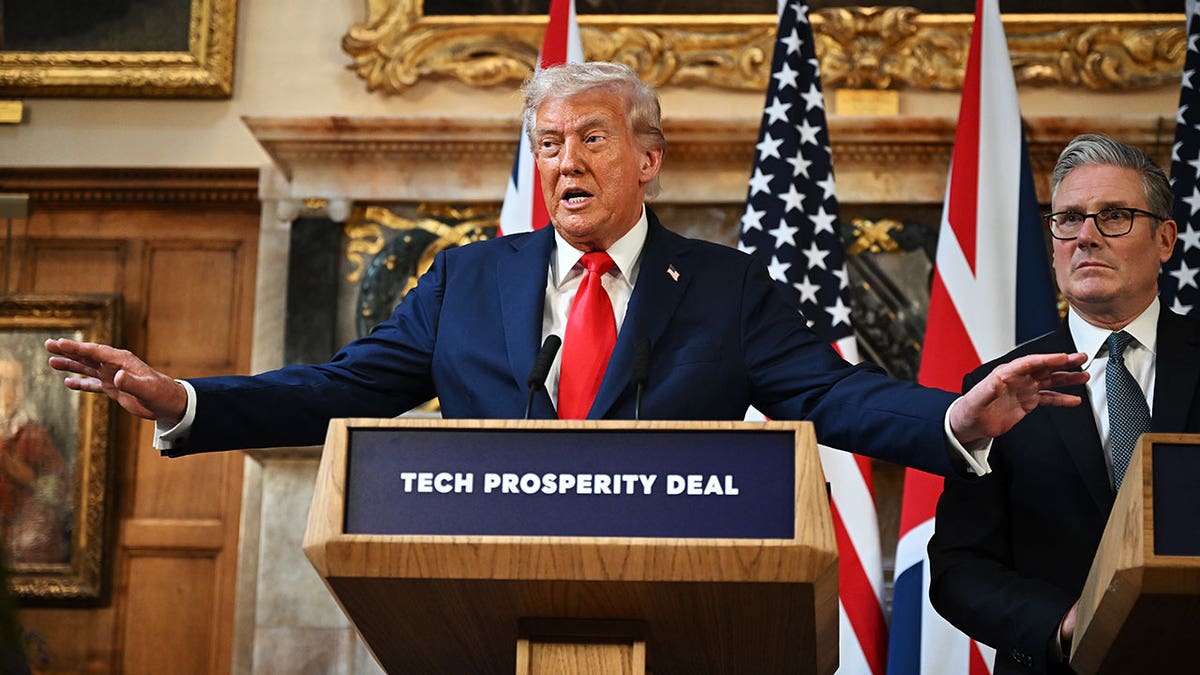
U.S. President Donald Trump talks at a press conference with U.K. Prime Minister Keir Starmer and warns World War III could happen over Russia’s continued war in Ukraine during an event at Aylesbury, England, on Sept. 18, 2025. (Leon Neal/Getty Images)
TRUMP AND ZELENSKYY TO MEET AS POLAND PRESSURES NATO ON NO FLY ZONE OVER UKRAINE
Concern over direct NATO conflict with Moscow escalated earlier this month after a swarm of at least 19 Russian drones not only flew over Polish airspace, but forced a multi-nation response when NATO, for the first time since the war began, fired upon Russian assets and brought down as many as four drones that posed a threat.
While Trump suggested that the drone swarm could have been a mistake, Poland refuted this and said it was «deliberate» and a «planned provocation.»
Drone strikes have long been a favored wartime tool of Russia’s in its operation against Ukraine, with the number of strikes peaking in July with some 6,297 long-range drones fired across the country.
That figure dipped to 4,216 drones fired in August. Though notably, the majority of those UAVs were fired between Aug. 16th and the 31st, when some 3,001 drones were deployed beginning the day after Trump met with Putin in Alaska on Aug. 15.
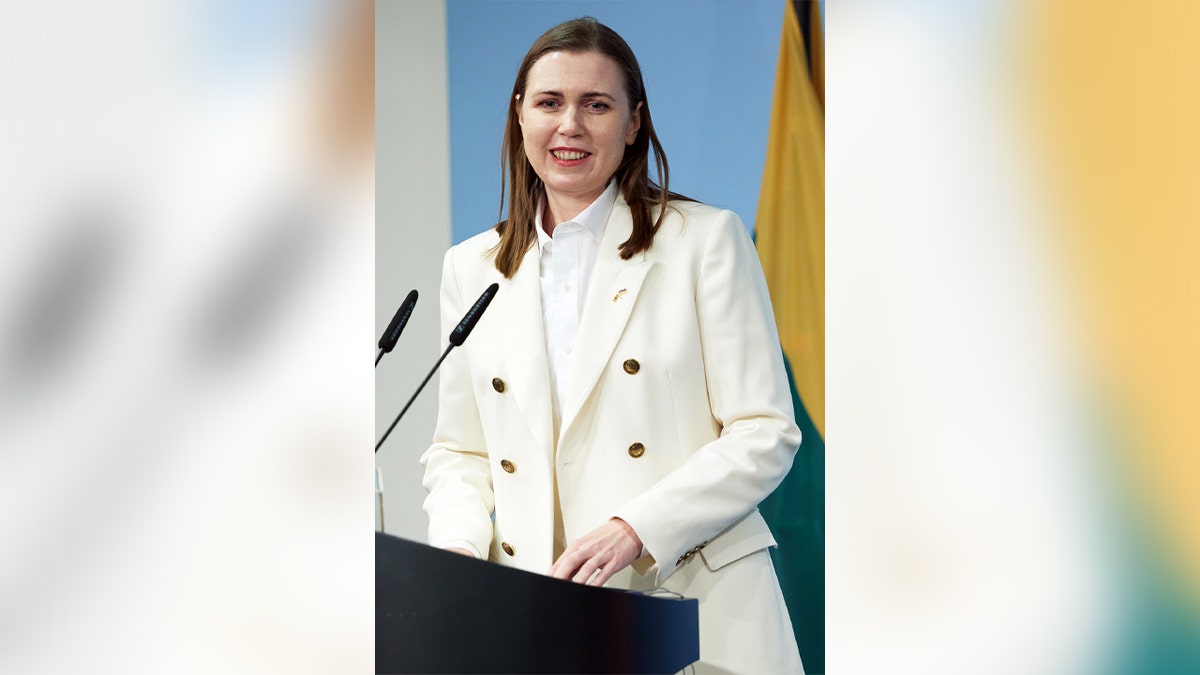
Minister of Defense of the Republic of Lithuania Dovile Sakaliene at a press conference. (Photo by Jörg Carstensen/picture alliance via Getty Images)
An American company, which sat less than 30 miles from two other NATO nations, Hungary and Slovakia, was also hit with «several» cruise missiles in late August.
«The scope of air attacks from Russia to Ukraine is really rising. They are using more drones, more rockets, and they are still expected to rise,» Sakaliene said.
«We have to admit and adapt to this new reality. High intensity war by Russia against Ukraine is ongoing,» the defense minister said. «That means that more and more UAVs are going to wander off into the territories of the bordering countries, and even further.»
Russia has increasingly turned to gray-zone tactics, which involve incidents that fall below the threshold of open warfare, but which allow Russia to test NATO’s resolve and response capabilities.
Over the last month, Poland saw three separate incidents in which its airspace was violated by Russian drones, including UAVs carrying explosive components that crossed into its airspace from both Ukraine and Belarus.
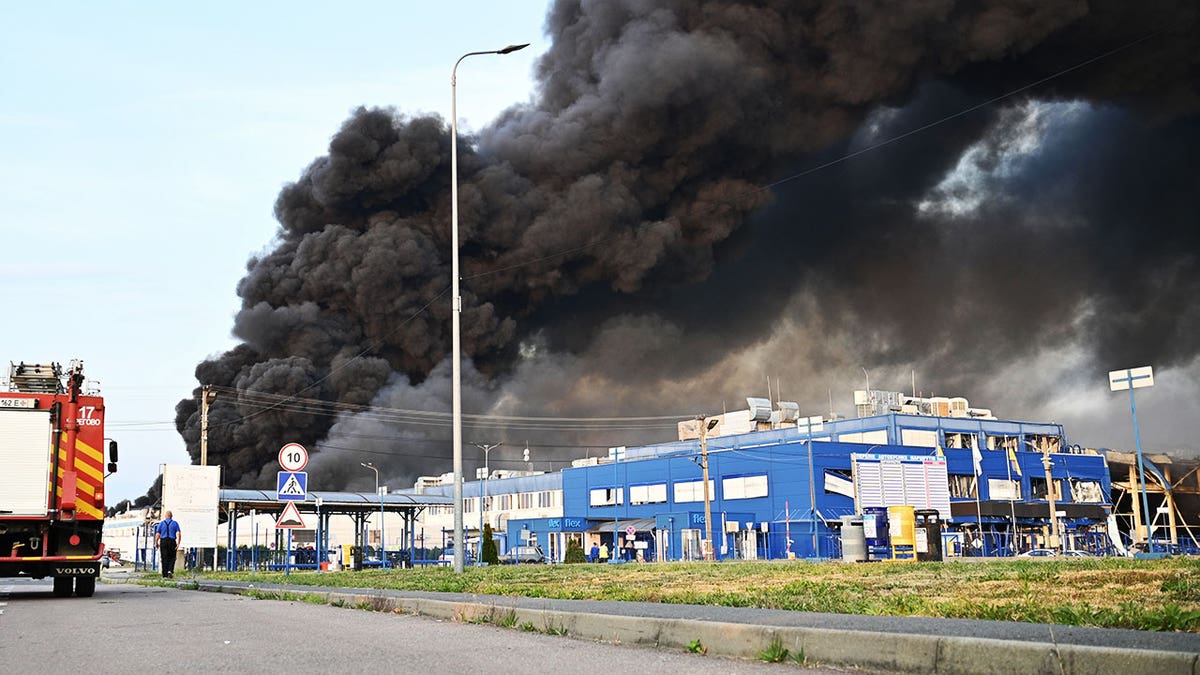
Black smoke rises from the electronics manufacturing company as firefighters continue to extinguish the fire after the Russian army hit a large American company producing civilian electronics with two missiles in Mukachevo, Zakarpattia region of Ukraine, on Aug. 21, 2025. (Zakarpattia Regional Military Administration / Handout/Anadolu via Getty Images)
TRUMP DEMANDS NATO ALLIES HALT RUSSIAN OIL PURCHASES BEFORE NEW US SANCTIONS
Just three days after the drone swarm bombarded Polish air defense systems, a Russian drone crossed into Romanian airspace and prompted a French fighter jet and Polish helicopter to respond under NATO’s Operation Eastern Sentry – a defensive posture the alliance launched just one day prior.
These events came after Lithuania in late July was forced to sound the alarm following two separate incidents in which Russian Gerber drones violated its borders, including one which was carrying explosives.
But these tactics are not the only threats that security experts in recent weeks have flagged as concerning behavior from Moscow.
Earlier this month, the Institute for the Study of War (ISW) based in Washington, D.C. drew attention to an op-ed published by former Russian president and current Security Council chair Dmitry Medvedev on Sept. 8 in the state-sponsored news outlet TASS, which used language that directly mirrored rhetoric by the Kremlin in the lead up to its invasion of Ukraine.
In his article, Medvedev accused Finland of being «Russophobic» and claimed, «the thirst for profit at the expense of Russia was installed in Finnish minds back in the days of Hitler.»
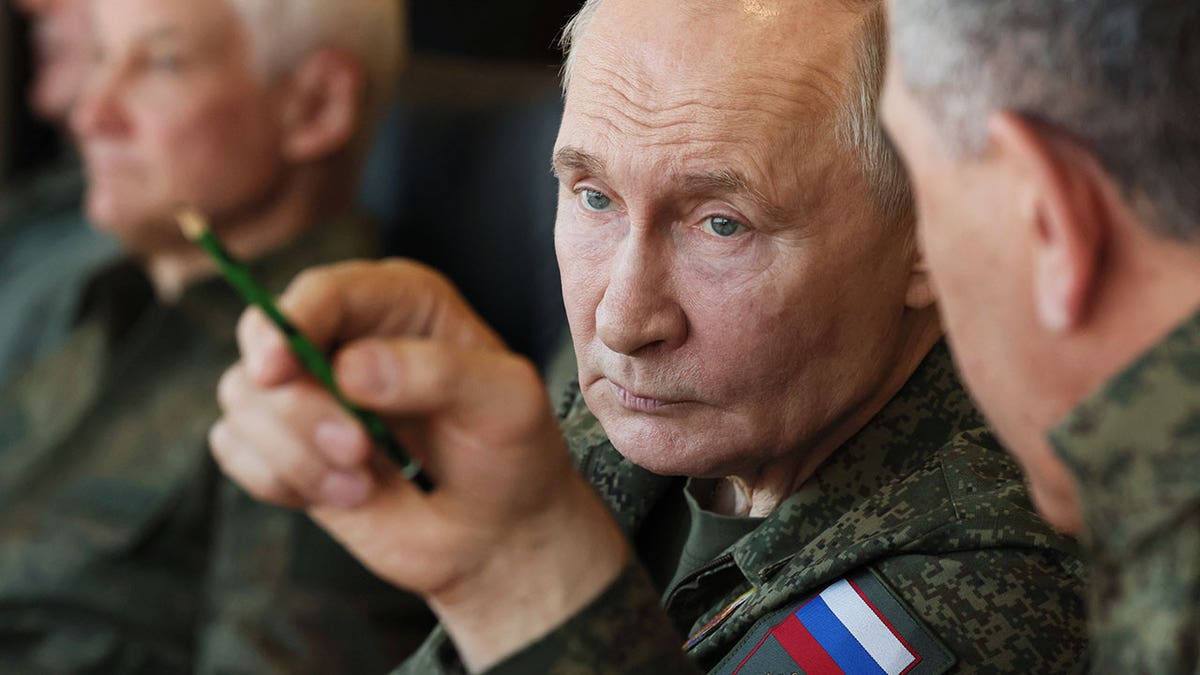
In this pool photograph distributed by the Russian state agency Sputnik, Russia’s President Vladimir Putin inspects the «Zapad-2025» (West-2025) joint Russian-Belarusian military drills at a training ground in the Nizhny Novgorod Oblast, Belarus, on Sept. 16, 2025. (Mikhail Metzel/POOL/AFP via Getty Images)
He further claimed that Helsinki has attempted to erase the «historical and cultural identity» of ethnic Russians and said joined NATO under the «guise» of defense, but in actuality, was covertly preparing for war against Russia, reported the ISW.
Medvedev’s comments were not stand-alone threats. Multiple Kremlin officials, including Putin who said «there will be problems» after Finland joined NATO, have claimed the alliance will use Finland as a «springboard» to attack Russia.
«Russia has been steadily setting conditions to attack NATO over the past several years: Moscow is standing up new divisions and optimizing its command and control headquarters on NATO’s eastern flank,» George Barros, Senior Russia Analyst with ISW told Fox News Digital. «The Kremlin information warfare apparatus is fabricating claims and justifications for why Finland, the Baltic States, and Poland are not real countries.
«These are the prerequisite preparations for future war that Moscow is preparing,» he warned.
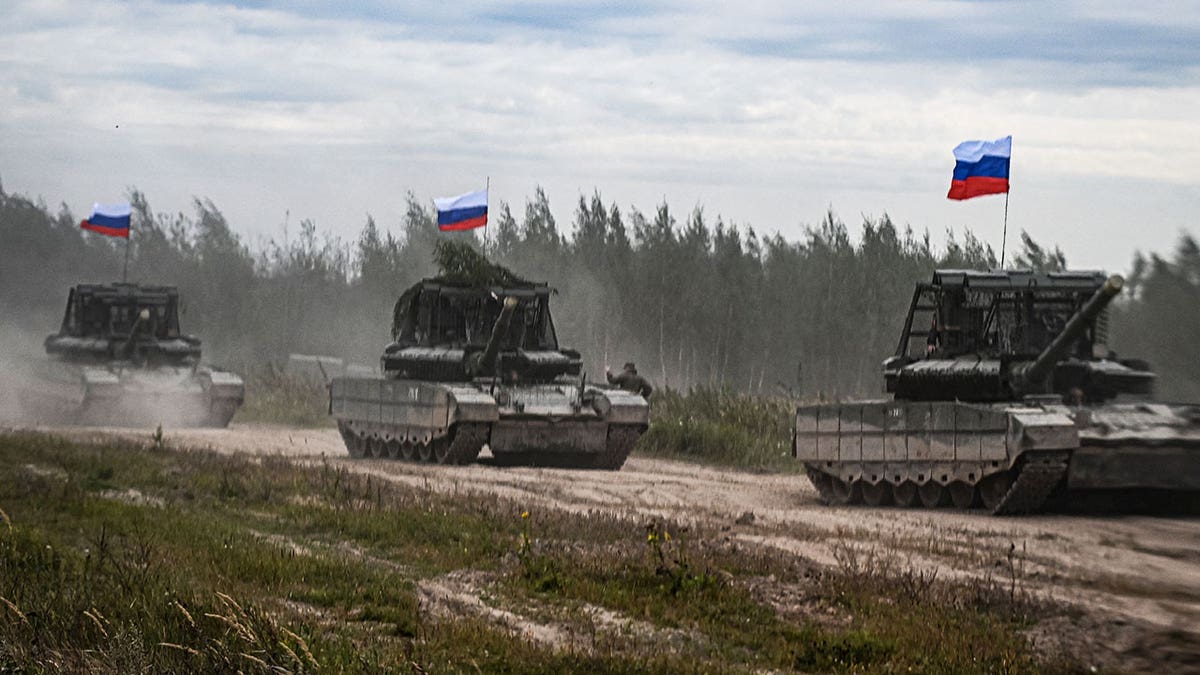
Russian tanks move during the «Zapad-2025» joint Russian-Belarusian military drills at a training ground near the town of Borisov, east of the capital Minsk, Belarus, on Sept. 15, 2025. (Olesya Kurpyayeva/AFP via Getty Images)
Sakaliene echoed these concerns and additionally pointed to Russia’s use of «soft power,» often employed through social media and traditional media, to influence public perception, which she warned is «alarmingly effective.»
CLICK HERE TO GET THE FOX NEWS APP
«We see a picture of a very aggressive country which is investing a disproportionate amount of its funds into their military capacity,» the defense minister said. «Despite heavy losses every week, every month, they are moving forward in Ukraine, and at the same time, they are expanding their capabilities.
«It raises considerable doubts if all that mass of military power is being accumulated only for Ukraine,» Sakaliene said.
russia,vladimir putin,nato,ukraine,donald trump,wars,world
INTERNACIONAL
De Fujimori a José Jerí: los presidentes de Perú investigados y expulsados del poder
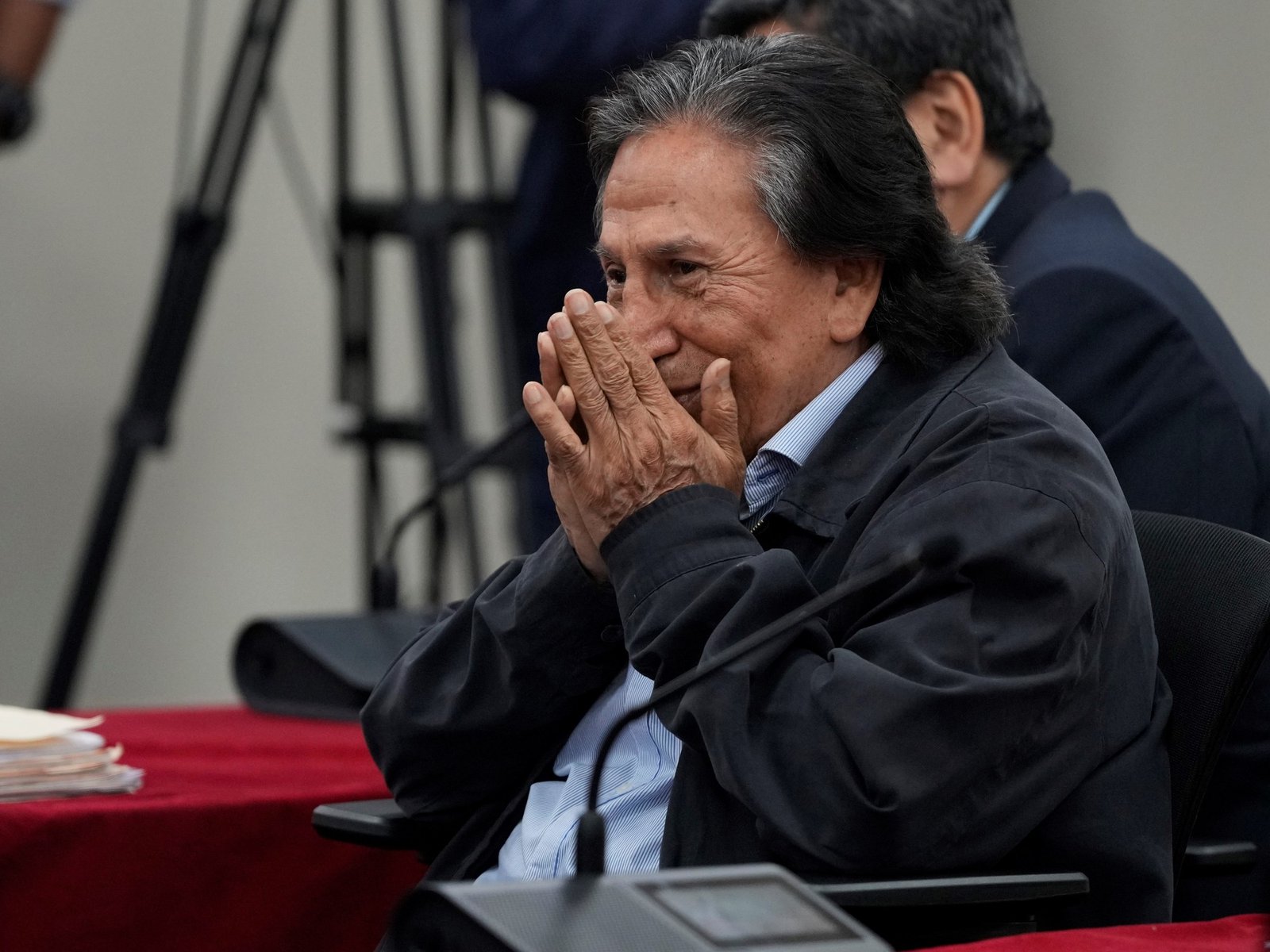
1. Alberto Fujimori (1990-2000)
2. Alejandro Toledo (2001-2006)
3. Alan García (1985-1990 y 2006-2011)
4. Ollanta Humala (2011-2016)
5. Pedro Pablo Kuczynski (2016-2018)
6. Martín Vizcarra (2018-2020)
7. Pedro Castillo (2021-2022)
8. Dina Boluarte
9. José Jerí
INTERNACIONAL
US moves to expand missiles in Philippines, putting China within range

NEWYou can now listen to Fox News articles!
The U.S. is preparing to expand the deployment of advanced missile systems in the northern Philippines, placing additional long-range strike capability within range of key Chinese military assets and reinforcing Washington’s effort to counter Beijing’s growing assertiveness across the Indo-Pacific.
U.S. and Philippine officials announced plans to increase deployments of «cutting-edge missile and unmanned systems» to the treaty ally, as both governments condemned what they described as China’s «illegal, coercive, aggressive and deceptive activities» in the South China Sea.
The move comes as confrontations between Chinese and Philippine vessels have intensified in disputed waters and as Beijing continues to pressure Taiwan, raising the stakes across the region’s most sensitive flashpoints.
It builds on the deployment of the U.S. Army’s Typhon missile system in northern Luzon, Philippines, a ground-based launcher capable of firing Tomahawk cruise missiles that can travel more than 1,000 miles.
TAIWAN UNVEILS $40B DEFENSE SPENDING PLAN TO COUNTER CHINA MILITARY THREAT OVER NEXT DECADE
The U.S. is preparing to expand the deployment of advanced missile systems in the northern Philippines. (Tim Kelly/Reuters)
Tomahawks can travel more than 1,000 miles — a range that, from northern Luzon, Philippines, places portions of southern China and major People’s Liberation Army (PLA) facilities within reach. The positioning also allows the U.S. and Philippine militaries to cover large swaths of the South China Sea and key maritime corridors connecting it to the broader Pacific.
The U.S. first deployed the Typhon system to Luzon, Philippines, in April 2024. An anti-ship missile launcher known as the Navy Marine Expeditionary Ship Interdiction System was deployed in 2025 to Batan Island in the northernmost Philippine province of Batanes.
That island faces the Bashi Channel, a strategic waterway just south of Taiwan that serves as a critical transit route for commercial shipping and military vessels moving between the South China Sea and the Western Pacific. Control of that channel would be vital in any potential Taiwan contingency.
BIPARTISAN HOUSE CHINA PANEL SLAMS BEIJING’S TAIWAN DRILLS AS ‘DELIBERATE ESCALATION’

U.S. and Philippine officials announced plans to increase deployments of «cutting-edge missile and unmanned systems» to the treaty ally, as both governments condemned what they described as China’s «illegal, coercive, aggressive and deceptive activities» in the South China Sea. (Eloisa Lopez/Reuters)
Beijing has urged Manila to withdraw the U.S. systems from its territory, but officials under President Ferdinand Marcos Jr. have rejected those demands.
«China has consistently stated its firm opposition to the United States’ deployment of advanced weapons systems in the Philippines. The introduction of strategic and offensive weapons that heighten regional tensions, fuel geopolitical confrontation, and risk triggering an arms race is extremely dangerous. Such actions are irresponsible to the people of the Philippines, to Southeast Asian nations, and to regional security as a whole,» Chinese embassy spokesperson Liu Pengyu told Fox News Digital. «The United States is not a party to disputes in the South China Sea and has no standing to intervene in maritime issues between China and the Philippines.»
«The Taiwan question lies at the very heart of China’s core interests. China’s determination to defend its national sovereignty, security, and territorial integrity is unwavering. Any provocation that crosses red lines on Taiwan will be met with resolute countermeasures, and any attempt to obstruct China’s reunification is doomed to fail,» Liu continued.
Neither side detailed how many additional systems would be sent or whether the deployments would be permanent, but Philippine Ambassador to Washington Jose Manuel Romualdez said U.S. and Filipino defense officials discussed deploying upgraded missile launchers that Manila may eventually seek to purchase.
«It’s a kind of system that’s really very sophisticated and will be deployed here in the hope that, down the road, we will be able to get our own,» Romualdez told The Associated Press.
Romualdez stressed that the deployments are intended as a deterrent.
CHINA WARNS OF RISING WAR RISK AFTER HISTORIC US ARMS SALE TO TAIWAN
«It’s purely for deterrence,» he said. «Every time the Chinese show any kind of aggression, it only strengthens our resolve to have these types.»
China repeatedly has objected to the missile deployments, warning they threaten regional stability and accusing Washington of trying to contain its rise.
In a joint statement following annual bilateral talks in Manila, the U.S. and the Philippines underscored their support for freedom of navigation and unimpeded commerce in the South China Sea — a vital global trade artery through which trillions of dollars in goods pass each year.

Members of the Chinese People’s Liberation Army (PLA) Navy march during the rehearsal ahead of a military parade to mark the 80th anniversary of the end of World War Two, in Beijing, Sept. 3, 2025. (Maxim Shemetov/Reuters)
«Both sides condemned China’s illegal, coercive, aggressive and deceptive activities in the South China Sea, recognizing their adverse effects on regional peace and stability and the economies of the Indo-Pacific and beyond,» the statement said.
China claims virtually the entire South China Sea despite an international tribunal ruling in 2016 that invalidated many of its sweeping claims. In recent years, Chinese coast guard and maritime militia vessels have clashed repeatedly with Philippine ships near disputed shoals, including Second Thomas Shoal.
HIGH STAKES ON THE HIGH SEAS AS US, CHINA TEST LIMITS OF MILITARY POWER
The expanded missile deployments also come as the Pentagon balances rising tensions in multiple theaters. In recent weeks, the USS Abraham Lincoln carrier strike group — which had been operating in the Indo-Pacific — was redirected toward the Middle East as the U.S. moved to bolster its posture amid escalating tensions with Iran.
The deployments also reflect a broader U.S. effort to strengthen its military posture along the so-called «first island chain» — a string of territories stretching from Japan through Taiwan and the Philippines that forms a natural barrier to Chinese naval expansion into the Pacific.
Washington has deepened defense cooperation with Manila under the Enhanced Defense Cooperation Agreement, expanding U.S. access to Philippine bases, including sites in northern Luzon close to Taiwan.
China in May released a national security white paper criticizing the deployment of an «intermediate-range missile system» in the region — widely viewed as a reference to the U.S. Typhon launcher in the Philippines. The document accused unnamed countries of reviving a «Cold War mentality» and forming military «small groups» that aggravate regional tensions.
For U.S. planners, dispersing mobile, land-based missile systems across allied territory complicates Beijing’s military calculus. Instead of relying solely on ships and aircraft, the U.S. can field ground-based systems that are harder to track and capable of holding Chinese naval and air assets at risk.
CLICK HERE TO DOWNLOAD THE FOX NEWS APP
For Beijing, however, such deployments reinforce its long-standing claim that the United States is encircling China militarily.
As tensions simmer in both the South China Sea and around Taiwan, the positioning of long-range U.S. missile systems on Philippine soil underscores how the strategic competition between Washington and Beijing is increasingly being defined by geography — and by which side can project credible deterrent power across it.
china,pacific,conflicts defense,defense
INTERNACIONAL
Por qué el arroz con huevo brinda los mismos beneficios que la carne roja en proteínas, según los expertos

La combinación de arroz con huevo, consumida a diario en numerosos hogares y comedores, se consolidó como una de las alternativas más eficientes y accesibles en términos nutricionales. Personas de diferentes edades y contextos la eligen por su practicidad, su bajo costo y su capacidad para aportar proteínas completas y energía sostenida. El interés por este plato creció especialmente entre quienes buscan una alimentación saludable y balanceada.
Tradicionalmente, el arroz con huevo fue visto como una solución ante la escasez o como un recurso rápido en la cocina. Sin embargo, los avances en la ciencia de los alimentos permitieron demostrar que esta mezcla supera a la carne roja en varios aspectos nutricionales. Deportistas, estudiantes y familias encuentran en este plato una fuente de proteínas, vitaminas y minerales esenciales para el funcionamiento del organismo.
Especialistas en nutrición y ciencia de los alimentos sostienen que el valor de esta combinación radica en la calidad de sus proteínas y en su aporte energético. Según investigaciones recientes citadas por O Globo, el arroz aporta energía rápida y fibra, mientras que el huevo completa el perfil de aminoácidos, logrando una proteína de alta calidad.
La combinación de arroz con huevo ofrece una proteína de alto valor biológico, comparable a la de la carne roja en términos de calidad y aprovechamiento por el organismo. Según la Organización de las Naciones Unidas para la Alimentación y la Agricultura (FAO), mezclar cereales como el arroz con huevo permite obtener todos los aminoácidos esenciales en proporciones óptimas, lo que hace que esta alternativa cumpla la misma función estructural y reparadora que las proteínas animales más reconocidas.

Esta equivalencia proteica, sumada a su bajo costo y accesibilidad, convierte al arroz con huevo en una opción eficiente y saludable para quienes buscan cubrir sus necesidades nutricionales sin recurrir necesariamente a la carne roja.
De acuerdo con O Globo, la clave nutricional del arroz con huevo reside en el concepto de Valor Biológico (VB). El arroz carece de lisina, un aminoácido esencial, pero el huevo lo contiene en cantidad suficiente para complementar el cereal. Así, el organismo aprovecha mejor las proteínas, que se utilizan para reparar tejidos, producir hormonas y mantener la masa muscular.
Diversos estudios comparativos muestran que la eficiencia de la proteína formada por arroz y huevo iguala o supera la de la carne roja. Esta combinación también resulta más económica y accesible, lo que favorece su inclusión en la dieta diaria. Quienes practican actividades físicas intensas o deportes de resistencia eligen el arroz con huevo como aliado estratégico por su fácil digestión y sus beneficios de recuperación muscular.
Bruno Román, especialista en ciencia de los alimentos, explicó al portal Miyeilis Flores: “El arroz con huevo es como un juego de Lego: el huevo coloca las piezas que faltan al arroz para construir salud”. Según Román, la sinergia entre ambos alimentos representa un ejemplo de optimización nutricional sin necesidad de recurrir a suplementos.

El arroz con huevo puede optimizarse mediante técnicas sencillas en la cocina. Una de ellas es el choque térmico: cocinar el arroz con anticipación, dejarlo enfriar en la heladera y luego recalentar suavemente antes de consumirlo. Según recomendaciones de expertos en nutrición, este proceso genera almidón resistente, una fibra que se absorbe lentamente y favorece la microbiota intestinal.
En materia de seguridad alimentaria, se aconseja lavar el arroz varias veces hasta que el agua salga transparente y utilizar suficiente agua en la cocción para reducir la presencia de arsénico, mineral que el cereal absorbe del suelo. El consumo responsable y cuidadoso garantiza un plato seguro y saludable para todos los integrantes de la familia.
Para evitar picos de glucosa en sangre, la sugerencia es acompañar el arroz con huevo con una porción de vegetales verdes. Según especialistas en endocrinología citados por O Globo, la fibra de estos vegetales ralentiza la absorción del almidón y ayuda a mantener estables los niveles de azúcar. Esta recomendación resulta especialmente útil para personas con diabetes o que buscan controlar el peso corporal.

El equilibrio en las proporciones de arroz y huevo es fundamental para obtener el máximo beneficio nutricional. De acuerdo con los expertos, la relación ideal consiste en media taza de arroz por cada huevo. Este balance evita el exceso de carbohidratos y asegura un buen aporte proteico, necesario para la regeneración y el crecimiento de los tejidos.
La cocción del huevo también requiere atención. Evitar el calor excesivo que dora las bordes previene la degradación de proteínas y la oxidación de las grasas saludables de la yema. Así, el valor nutricional se mantiene intacto y el plato conserva su eficacia como fuente de energía y nutrientes.
El arroz con huevo admite múltiples variantes según los objetivos personales y las costumbres regionales. Algunas personas añaden verduras frescas, hierbas o especias para enriquecer el sabor y sumar nutrientes. Otras prefieren incorporar aceite de oliva o semillas para aumentar el contenido de ácidos grasos saludables, siempre cuidando la moderación y el equilibrio.

El arroz con huevo no solo destaca por su valor nutricional, sino también por su bajo costo y su versatilidad en la cocina. Esta preparación permite alimentar a grandes grupos familiares y se adapta tanto al desayuno como al almuerzo o la cena. Además, constituye una alternativa sostenible en comparación con las carnes rojas, cuyo impacto ambiental resulta considerablemente mayor.
El conocimiento y la difusión de los beneficios del arroz con huevo permiten tomar decisiones alimentarias más informadas. Incorporar esta combinación a la rutina diaria contribuye a la salud individual y colectiva. La simplicidad de los ingredientes y la facilidad de preparación convierten al arroz con huevo en una herramienta clave para una alimentación equilibrada.
Optimizar la preparación y acompañar el plato con vegetales asegura el máximo aprovechamiento de sus ventajas. El arroz con huevo confirma que la nutrición de calidad puede ser accesible, económica y deliciosa.
arroz con huevo

 POLITICA1 día ago
POLITICA1 día agoCristian Ritondo: “Vamos a apoyar la ley de modernización laboral, pero no el régimen de licencias por enfermedad”

 POLITICA3 días ago
POLITICA3 días agoUno de los jefes de la CGT adelantó que convocarán a un paro general por la reforma laboral: “Trabajaremos para que sea una gran huelga”

 POLITICA13 horas ago
POLITICA13 horas agoReforma laboral bomba: menos indemnización, más horas y despidos más fáciles — el cambio que puede sacudir el empleo en Argentina

